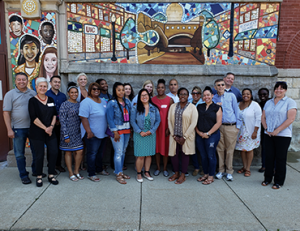 This summer, the Graduate School of Education partnered with the Center for Children and Technology, an educational research and development organization at the Education Development Center (EDC), to host two week-long Math for All Facilitator Institutes in Illinois. The professional development program is designed to help schools and districts make high-quality K-5 math instruction accessible to all students, including those with disabilities.
This summer, the Graduate School of Education partnered with the Center for Children and Technology, an educational research and development organization at the Education Development Center (EDC), to host two week-long Math for All Facilitator Institutes in Illinois. The professional development program is designed to help schools and districts make high-quality K-5 math instruction accessible to all students, including those with disabilities.
Presented by a team of Bank Street faculty and adjuncts as well as EDC staff developers, the training helps educators become more skilled in planning cognitively demanding math lessons and tailoring instructional strategies to reach all students through a neurodevelopment-based approach. The program model also builds collaboration between general and special education teachers by including opportunities for team lesson planning.
“By viewing learners through a neurodevelopmental lens—a framework for learning that consists of eight different systems such as attention, memory, and language—teachers are able to gain a comprehensive understanding of the strengths and needs of individual students and then use these observations to create more accessible lesson plans,” said Marvin Cohen, Supervised Fieldwork Advisor and Course Instructor, Bank Street Graduate School of Education, Co-Developer of Math for All, and Co-Principal Investigator on the program’s grant. “This summer, we utilized a ‘train the-trainer’ model at our Facilitator Institutes with public schools from Chicago and Northwestern Illinois, which prepared participants to return to their schools with the knowledge and skills to train their colleagues.”
As part of the summer institutes, participating educators complete the training and act as Math for All facilitators in leading a 40-hour professional development workshop at their school or district over the next two school years. During this time, Math for All continues to work with the new facilitators by offering online support and a follow-up meeting at the end of the year. Additionally, Math for All conducts research with participating schools and districts through surveys, observations, and interviews to help inform future professional development.
The program has made a real impact with local educators and students. Results based on research from a previous Randomized Controlled Trial (RCT) study of the program showed a positive impact on both student learning and teacher instruction, with Math for All teachers rating higher in emotional and instructional support, classroom organization, and student engagement. Additionally, the study noted that collaboration between teachers increased as well as their understanding of how to plan rigorous math lessons for a wide range of learners.
“Strong professional development and mathematics education programs help teachers and leaders develop a deeper understanding of mathematics and how students learn,” said Robin Hummel, Director and Course Instructor, Leadership Programs, Bank Street Graduate School of Education. “A primary focus of both Math for All and Bank Street’s mathematics education programs is to prepare educators with high-quality teaching practices that respond to and support the strengths and needs of diverse learners. We believe all students can be mathematicians.”
Nine schools from Illinois’ Regional Office of Education 47 and 13 schools from Chicago Public Schools (CPS) participated in the training. Funded by the Education Innovation and Research program of the U.S. Department of Education, the professional development program aims to replicate the success achieved in CPS during the previous four years through an Institute of Education Sciences grant.
School districts eligible to participate in this year’s program were required to serve a high-need student population in Illinois in which more than 50 percent of students are from low-income households, 14 percent or more students have individualized education plans, or 50 percent or more of grade 5 students perform below the proficient level on the state-mandated mathematics achievement test. A follow-up meeting for this year’s participants to reflect and share experiences is planned for June 2020.